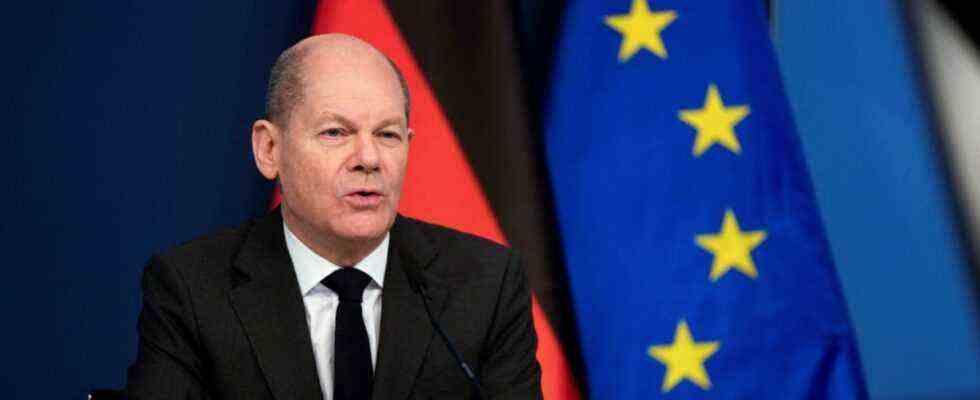“Keep the caviar, put the mink in the closet. Davos is dead, again”. reported disappointed political recently that the “glittering” annual meeting of the World Economic Forum in fashionable Davos has been “put on hold” for the second time. See and be seen, save the world and make money from it – under this motto, the world’s most influential and powerful gathered high up in the Swiss mountains every year in January. Corona has reduced the annual kick-off meeting of the global business elite to a screen show.
However, a lack of glamor did not stop Olaf Scholz (SPD) from making his first appearance as Chancellor in the virtual replacement show this Wednesday. “I’m sure most of us would have wished for a different start to the year,” said the Federal Chancellor in his first foreign policy speech to an international audience. He would have liked to travel directly to Davos to present the main lines of the new traffic light coalition and the great transformation process that has now begun. But the circumstances are different. “Our digital meeting today is proof that we are still struggling with the pandemic.”
The World Economic Forum in Davos started on Monday, purely virtually, for three days. This year’s slogan wants to show a way out of the global pessimistic pandemic mood: “Work together, regain trust”. It is a good tradition that representatives of the German federal government also hold discussions in the mountains. The former Chancellor Angela Merkel (CDU) traveled regularly – always trying to keep the open borders of the export country Germany. In 2018, she even used world history to promote international cooperation: “Since the Roman Empire and the Great Wall of China, we have known that isolation does not promise security”. Merkel opposed the then US President Donald Trump and his “America First”.
In 2020, Olaf Scholz, then still Federal Minister of Finance and Vice Chancellor, got caught up in the dispute between Europe and the USA over a common climate policy. Trump’s Treasury Secretary Steven Mnuchin downplayed the risks of global warming in the final round of debates on the last day, saying climate protection was just one of several problems, the costs were overestimated, and a carbon tax would only affect hard-working people. The President of the European Central Bank, Christine Lagarde, countered that in future she would include climate risks in economic modelling; Scholz also reported on Germany’s hard course against climate change. Collision between Europe and the US,” headlined the British newspaper the Guardians.
First example: the Russia-Ukraine conflict
Two years later, Scholz praises the hosts’ idea of creating new trust through cooperation all the more. First example: the Russia-Ukraine conflict. They have been talking in different formats since the beginning of January, it is still too early to see whether this could de-escalate the dispute, but “after years of increasing confrontation, being silent is not a sensible option”. Peace is the greatest international good, said Scholz, and it can only be preserved through international cooperation.
This also applies to combating the pandemic, the second major issue. Scholz quoted the Israeli historian Yuval Harari, “the great advantage that humans have over the viruses is that we can work together in a way that they cannot”. This is exactly what is happening: Europeans benefit from the research data in Israel, Africa and the USA. Scientists worldwide shared their data on mutations. And two German scientists have developed a vaccine based on new mRNA technology that will help save millions of lives.
Scholz recalled the meeting in Davos in 2000, when the global vaccination alliance was decided. “Today, 21 years later, vaccination is by far the best tool to find our way out of the pandemic.” The chancellor repeated his call for urgency: “Without a real immunization campaign, we will no longer have any letters of the Greek alphabet for new virus variants”. And makes the global business elite responsible: “In the spirit of Davos, let us completely finance the international vaccination campaign”. That would also be “the booster shot that our economy needs”. So far, Germany has been the second largest donor to the Covax campaign, which could immunize 70 percent of the world’s population by the middle of the year.
The Chancellor is also promoting new partnerships, especially with private investors, to advance the fight against climate change. For him the biggest industrial revolution in 100 years. He is promoting an international climate club, whose members coordinate their climate protection measures so that they do not build mutual barriers in trade. “Ambitious, bold, cooperative is the ABC of the climate club,” says the Chancellor. Incidentally, the climate club is by no means exclusive, he adds – and it resonates unsaid: “like the one here in Davos”.
The failure of the meeting in the mountains hits the organizers hard. According to estimates, they lose tens of millions of euros in sales as a result. The last regular meeting in 2020 was attended by more than 100 millionaires and 53 heads of state and government. Companies make the forum very expensive – they pay around 50,000 US dollars for a ticket that guarantees access to the guest lists.

